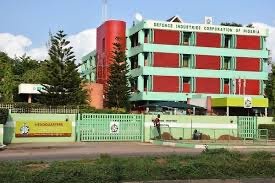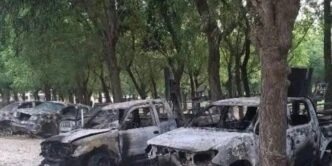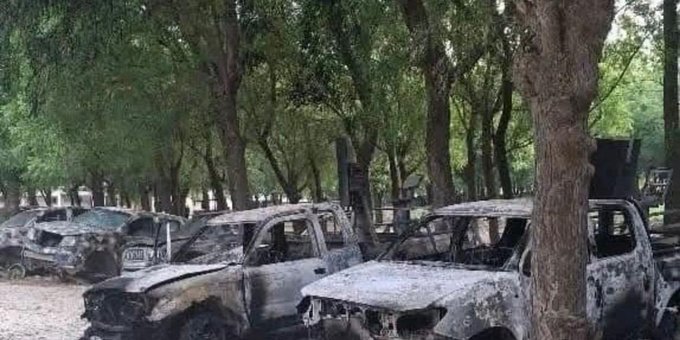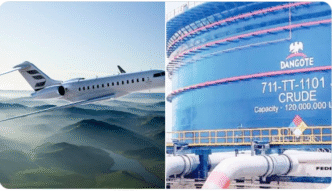Kaduna, Nigeria – September 20, 2025 – Tragedy struck in the early hours of Saturday as an explosion ripped through the Defence Industries Corporation of Nigeria (DICON) factory, situated in the Kakuri Industrial area of Kaduna South Local Government, leaving at least two persons dead and sparking panic across the community.
The incident, which occurred within one of the production sections of the facility, was confirmed by eyewitnesses, security operatives, and emergency responders. Thick plumes of smoke were seen billowing from the premises as fire service personnel and first responders rushed to the scene to prevent further damage.
The Incident
According to initial reports, the explosion happened at approximately 10:30 a.m., while workers were engaged in routine operations inside the factory. DICON, Nigeria’s foremost defence production establishment, is known for manufacturing weapons, ammunition, and other military hardware for the Nigerian Armed Forces and security agencies.
Witnesses said the explosion was so loud that it shook nearby buildings, shattering glass and sending vibrations several kilometers away. Residents of Kakuri and adjoining areas initially mistook the blast for a bomb attack before realizing it emanated from the factory.
“I was in my shop when I suddenly heard a thunderous bang. Everywhere shook, and people started running in confusion. Moments later, we saw heavy smoke rising from the DICON side,” said a trader identified as Musa Ibrahim, whose shop is located near the factory gate.
Casualties and Emergency Response
The Kaduna State Emergency Management Agency (KADSEMA) confirmed that two persons lost their lives as a direct result of the explosion. Several others reportedly sustained varying degrees of injuries and were rushed to nearby hospitals for treatment.
Officials of the Kaduna State Fire Service, the Nigerian Army, and the Nigeria Police Force were deployed immediately to secure the area. Emergency responders battled tirelessly to contain the fire and prevent further explosions, given the sensitive nature of materials stored within the facility.
A senior security official, who spoke on condition of anonymity, described the situation as “very delicate” due to the presence of explosives and ammunition in the production plant. “We had to act quickly to stop the fire from spreading. If it had reached the ammunition depot, the consequences would have been catastrophic, not just for DICON but for the entire Kakuri community,” the official said.
Community Panic and Security Concerns
Residents of Kakuri, a heavily populated industrial suburb in Kaduna South, were thrown into fear following the incident. Many abandoned their homes and businesses, fleeing to safer areas until news spread that the explosion had been contained within the DICON premises.
“This community has always lived with the fear of accidents because of the nature of DICON’s work. We know they produce weapons and explosives, and once in a while, we hear strange noises from the factory. But today’s blast was on another level,” said Grace Nwankwo, a resident.
Parents were seen rushing to schools in the area to pick up their children, while commercial activities were temporarily disrupted. Security operatives cordoned off the factory area to prevent unauthorized access and to allow investigators to begin their work.
Official Reactions
As news of the explosion spread, Kaduna State authorities and security officials moved swiftly to reassure the public.
In a statement issued by the Kaduna State Government, officials confirmed the deaths and expressed condolences to the affected families. “The government of Kaduna State deeply regrets the unfortunate incident at the Defence Industries Corporation of Nigeria (DICON), which claimed two lives today. We extend our deepest sympathies to the families of the deceased and assure residents that emergency measures have been taken to secure the area,” the statement read.
The Nigerian Army, which oversees DICON, also promised a thorough investigation into the cause of the explosion. A military spokesperson described the incident as “tragic but contained,” emphasizing that there was no immediate threat to public safety. “Our technical teams are already on ground conducting damage assessment and ensuring that the facility is stabilized. Further information will be communicated to the public once investigations are complete,” the spokesperson said.
Background on DICON
The Defence Industries Corporation of Nigeria, popularly known as DICON, was established in 1964 by an Act of Parliament to produce small arms, ammunition, and other military equipment for Nigeria’s defence sector. Located in Kakuri, Kaduna, the facility has played a key role in supporting the Nigerian Armed Forces during conflicts and counterterrorism operations.
Over the years, DICON has expanded its operations to include the production of light weapons, armored vehicles, explosives, and protective gear. However, due to the sensitive nature of its production, the factory has occasionally been at the center of safety concerns.
This is not the first time safety fears have been raised at the facility. In past years, workers and residents have occasionally complained about inadequate safety protocols, though management has often dismissed such claims as exaggerated. Today’s explosion may once again bring those concerns into national focus.
Possible Causes
Although the exact cause of the explosion has not yet been determined, experts believe it may have been triggered by mishandling of explosive materials, machine malfunction, or chemical reactions during production. Industrial safety analysts have long warned that ammunition factories carry inherent risks that require strict adherence to global best practices.
“It is too early to conclude what happened, but such incidents usually result from lapses in safety management. Even a small spark can trigger a devastating explosion in such environments,” said Dr. James Olatunji, an industrial safety consultant.
Human Impact
The human cost of the tragedy is already evident. Families of the deceased have been left in grief, while survivors are battling injuries. Residents remain traumatized by the experience, fearing possible recurrence.
Civil society groups have also called for greater transparency in the operations of DICON, urging the government to prioritize the safety of workers and nearby communities. “This incident should serve as a wake-up call. Military secrecy should not be an excuse for neglecting safety standards that endanger innocent lives,” said one advocacy group in Kaduna.
Calls for Investigation and Reform
Analysts say this latest explosion underscores the urgent need for comprehensive audits of all defence-related factories in Nigeria. Stakeholders argue that beyond investigating the immediate cause, authorities must address systemic lapses in safety practices, staff training, and emergency preparedness.
The Nigerian Labour Congress (NLC), Kaduna chapter, in a brief statement, demanded that the welfare of workers at DICON be given priority. “Every life matters, and no worker should have to die in preventable workplace accidents. The families of the victims must be adequately compensated,” the NLC stated.
Wider Implications
The incident could have wider national implications. DICON remains central to Nigeria’s efforts at self-sufficiency in defence production, particularly at a time when the military is heavily engaged in counter-insurgency and counter-banditry operations. Any disruption in DICON’s operations could impact the availability of locally produced arms and ammunition for security agencies.
Furthermore, the tragedy raises questions about industrial safety oversight in Nigeria’s defence and energy sectors, where accidents have occasionally occurred with devastating consequences.
Conclusion
As Kaduna counts its losses from today’s explosion at DICON, the incident serves as a painful reminder of the delicate balance between national security production and public safety. While the factory plays a vital role in Nigeria’s defence architecture, its location within a densely populated community demands the highest standards of safety and accountability.
The death of two individuals in the line of duty is a heavy price, and calls are mounting for a transparent investigation, better safety enforcement, and compensation for affected families. Nigerians now wait to see how swiftly and effectively the government and military authorities will respond, not just to the immediate tragedy but to the broader issues of industrial safety and accountability in sensitive national facilities.













